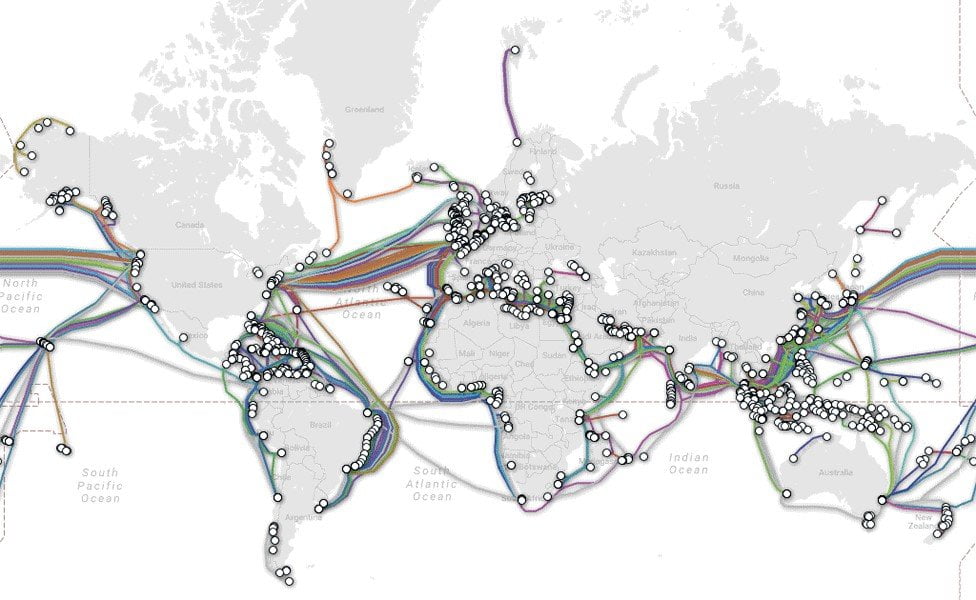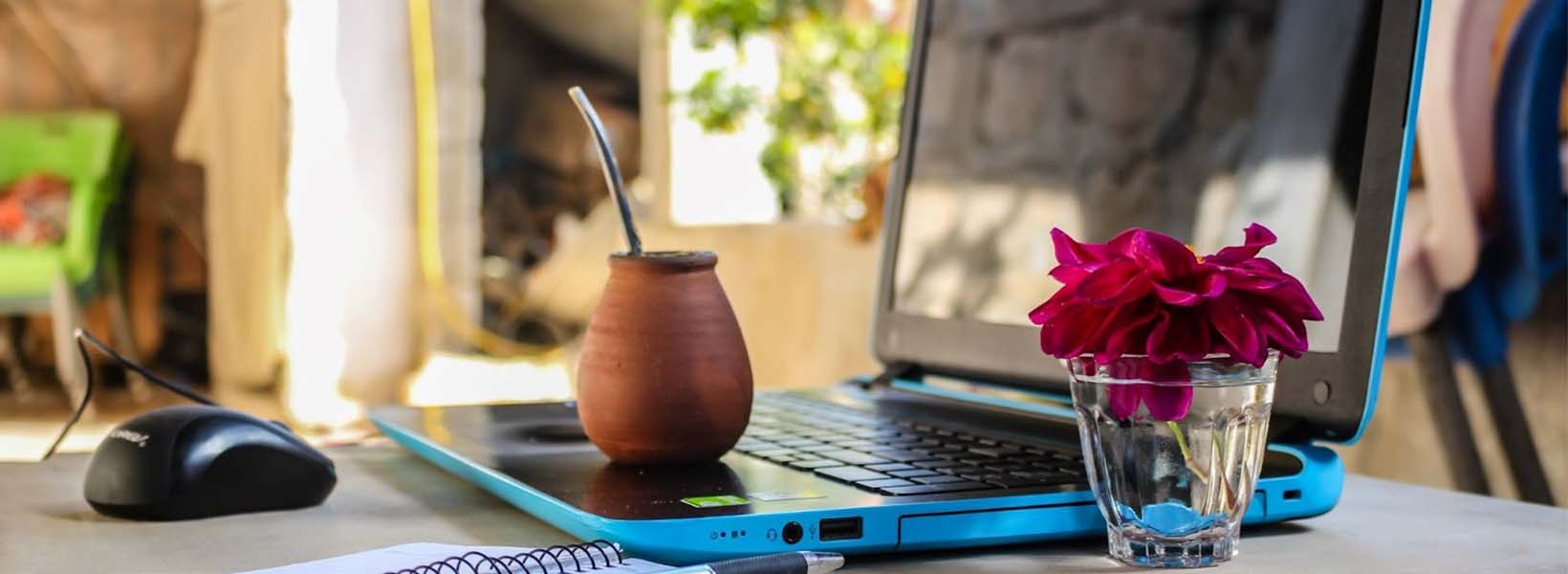Introduction
Can you imagine living without access to the internet? Internet connectivity has become an essential feature in all sectors. Governments, civil society, academia, as well as the technological, industrial and hospitality sectors all require the internet to function effectively. This level of connectivity prevents islands from being isolated, and facilitates adaptation to change.
How Are Islands Connected to the Internet?
Data from the World Bank has indicated that there has been a steady increase in the rise of the percentages of populations who have access to the internet in countries around the world, including islands. This connectivity has been achieved mainly through the laying of undersea cables that connect islands to their respective mainlands, and to the continents beyond. Back in 2016, 99% of all international data was transferred through cables stretching across the floor of the world’s oceans.
In this map made by Telegeography, you can see the 464 cable systems and 1,245 landing stations that were active or under construction in 2021. You can also see an interactive version here.

What are the main challenges in providing internet connectivity to islands?
The necessary infrastructure to create thorough levels of connectivity is notoriously complex and expensive, and the process requires access to state-of-the-art construction machinery and technological expertise. The financial resources required to secure these are often beyond the reach of island economies.
Remoteness is another factor that increases the cost of connectivity. Because copper or fiber optic cables are costly to install, internet service providers frequently focus on metropolitan regions where they can get the most bang for their dollars, leaving rural and remote populations out. Island territories also face environmental challenges, such as extreme weather events, which necessitate additional expenditure in making networks more resilient and durable. In Indonesia, the world’s largest archipelago, the rural areas that make up most of the country frequently lack any form of Internet connection.
Can you get internet access on a remote island?
Despite the challenges outlined above, it is indeed possible to get internet access in remote island territories. For example, in Tokelau, which is considered one of the world’s most remote territories, gained the benefits of faster, more affordable, and more reliable internet access in September 2021 when the construction of a submarine fiber-optic cable network was completed on Nukunonu, one of Tokelau’s three atolls.
This facilitated the linking of the various atolls with Hawaii. The Minister for Telecommunications, Mose Pelasio, explained the significance of this event, stating “…these initiatives bring life-changing benefits to us all – enhancing and reinforcing our culture and economy, resolving our remoteness by linking us closer to other parts of the world, and most importantly raising our awareness and recognition in the international and regional communities.”
Why is it Important for Islands to have Broadband Access?
Broadband provides high speed internet access via multiple types of technologies including fiber optics, wireless, and cable. It is generally faster than dial-up internet, and without it, it is challenging for island economies to grow consistently. Businesses need to be able to connect to the internet reliably in order to offer a full range of services to potential consumers.
However, the availability of broadband access has a relevance and resonance that is beyond the role of economy. There is a deeper social and community benefit from having broadband. According to research conducted by Island Institute, high speed internet can help keep a community vibrant and dynamic by attracting new, young families to start their lives, and become a part of the community.
The families of lobster fisherman who live on the islands off the coast of Maine benefit from improved connectivity, as their children are able to attend online school. Also, if their income is not enough to support the family, spouses have the opportunity to work remotely once there is access to quality internet. The ability to connect online broadens the range of employment opportunities available to island inhabitants, and gives access to a multitude of different careers.
Economic development and stability
Despite having small populations, there are many small islands that have a relatively high ratio of businesses to people. An example of this is the Irish island of Arranmore, located 5 kilometers off the coast of Donegal. Some of the local businesses that are now thriving thanks to reliable internet connectivity include independent artists, basket weaving, the local health center, and a hostel. Before the technological upgrade, Arranmore was experiencing a steady decline in population, and businesses were struggling because simple tasks such as sending files and uploading documents often needed to be done on the mainland. Not only was this inconvenient, it was also unsustainable, and many business owners made the decision to migrate.
The improved internet access has already had an indelibly positive effect on preserving the culture and community, and the local community center now has connectivity. It has become a place where there are youth clubs, courses are offered, and the health center provides telemedicine services. This improved level of social stability has resulted in the return to the island by the members of its diaspora.
The construction of the undersea cable connecting the Andaban and Nicobar islands to the Indian mainland has resulted in the potential for islanders to benefit from the ability to diversify their economy beyond tourism.
Remote work and island tourism
Many small island developing states suffered devastating economic consequences from the negative effects of the COVID-19 on the travel industry. Internet connectivity provided a way for them to recover, and this was done by the emergence of special work visas, which facilitated the presence of digital nomads to contribute to local economies. Examples include the Barbados 12 Month Welcome Stamp, Dominica’s Work In Nature Program, and Digital Nomads Madeira.
Island Innovation can assist your island in either developing or promoting a remote work program.
Internet connectivity is crucial to tourism, as it also has a major direct impact on mobile operators’ revenues, expanding the market and creating. Many tourists purchase local SIM cards, which is a more economical option compared to international roaming. In fact, many mobile operators have set up special airport kiosks in order to sell SIM cards to arriving tourists.
Access to online education
A study published by the Internet Society established that online access and tools are important for education, a reality that became even more relevant when the pandemic resulted in many schools being closed, and online teaching became the primary mode of education. Even before COVID-19, it was generally acknowledged that the availability of computers and the Internet in schools helps promote basic digital literacy, as well as more advanced skills that enable students to seek ICT-related careers.
Online education provides islanders with additional opportunities relating to learning new languages, studying at a wide range of international academic institutions, and accessing a multiplicity of career choices.
Communication in cases of emergency
The recent eruption of an underwater volcano near Tonga has shed light on the crucial role of internet connectivity in dealing with emergencies. Humanitarian organizations, national authorities, and affected populations all need to be able to communicate to have access to relevant and life-saving information. Emergency warning systems that rely on telecommunication are the safest option in the days and hours leading up to an emergency situation.
An undersea fibre-optic cable which connects Tonga to the rest of the world was severed during the eruption of the volcano, and this, along with the tsunami which followed, led to Tonga’s 110,000 people being cut off. The process of mending will take between five and seven days, and will involve sending a pulse of light from the island, then measuring how long it takes to travel to the point of the break and establish where the break is. A cable-repair boat will be sent to the location of the first break, and then send either an ROV (remotely-operated underwater vehicle) or a tool known as a grapnel (a hook attached to a chain) to retrieve the broken end. That will be re-joined to new cable on board the boat and then the same process will happen at the other end of the break.
This incident has highlighted the necessity of ensuring that there are multiple modes of internet connectivity for remote regions. In more developed and accessible regions, there are various cables leading to any one country. For example, there are 50 different cables supplying data to the UK. By contrast, there was only one for Tonga. And, although the government of Tonga signed a deal in 2019 to get satellite connectivity, this proved ineffective against the thick layer of volcanic ash that covered the country.
How to Make Online Information More Accessible to Islanders
Island communities can often be plagued by social disparities and economic exclusion. This exclusion is frequently typified by some segments of the population not having access to the internet, and the information that is provided online. In rural and indigenous communities, which can be disadvantaged by a lack of access to social services, it is even more important to provide internet access.
Local hubs
Spaces that can be used to facilitate the safe gathering of people with the appropriate levels of physical distance include community halls, libraries, and schools. These spaces, once outfitted with the requisite infrastructure to facilitate broadband access, can be used as places where members of the community gather to access online events, or any essential information.
Hybrid events
Digital inclusion can be further enhanced by promoting and hosting hybrid events. These are events that combine both in-person and virtual experiences, and they are quickly becoming an essential aspect of the events industry. Some benefits of hybrid events include increased audience attendance, greater audience engagement, easier access to data, and reduced environmental impact. These types of events also increase the inclusivity in relation to inhabitants of remote island territories, and the insights that they can provide during such events.
Register for our next event, the Island Finance Forum, the premier global event for sustainable finance and investment for islands!
Conclusion
Access to digital information provided via the internet has revolutionized the way that island communities learn, communicate, do business, and treat illnesses. Some of these islands face numerous challenges in internet connectivity due to their remoteness and the high cost of providing the necessary technological infrastructure. The COVID-19 pandemic has exacerbated the realization that reliable access to the internet has a significant impact on small islands by boosting economic prosperity, as well as reducing social isolation. Also, telecommunication operators contribute a significant share of the economy, as these companies, contributing a significant amount to government budgets through taxes, and provide significant levels of employment.
You may also like:
- Discover Dominica’s “Work In Nature” Programme
- [Webinar] The Future of Hybrid Events
- Internet Options Expanding For Hawaiian Homesteaders
- Nicola Sturgeon Promises Thousands Of Superfast Broadband Connections Within Six Months
- Highlands To Benefit From Improvements To 4G Network Coverage




